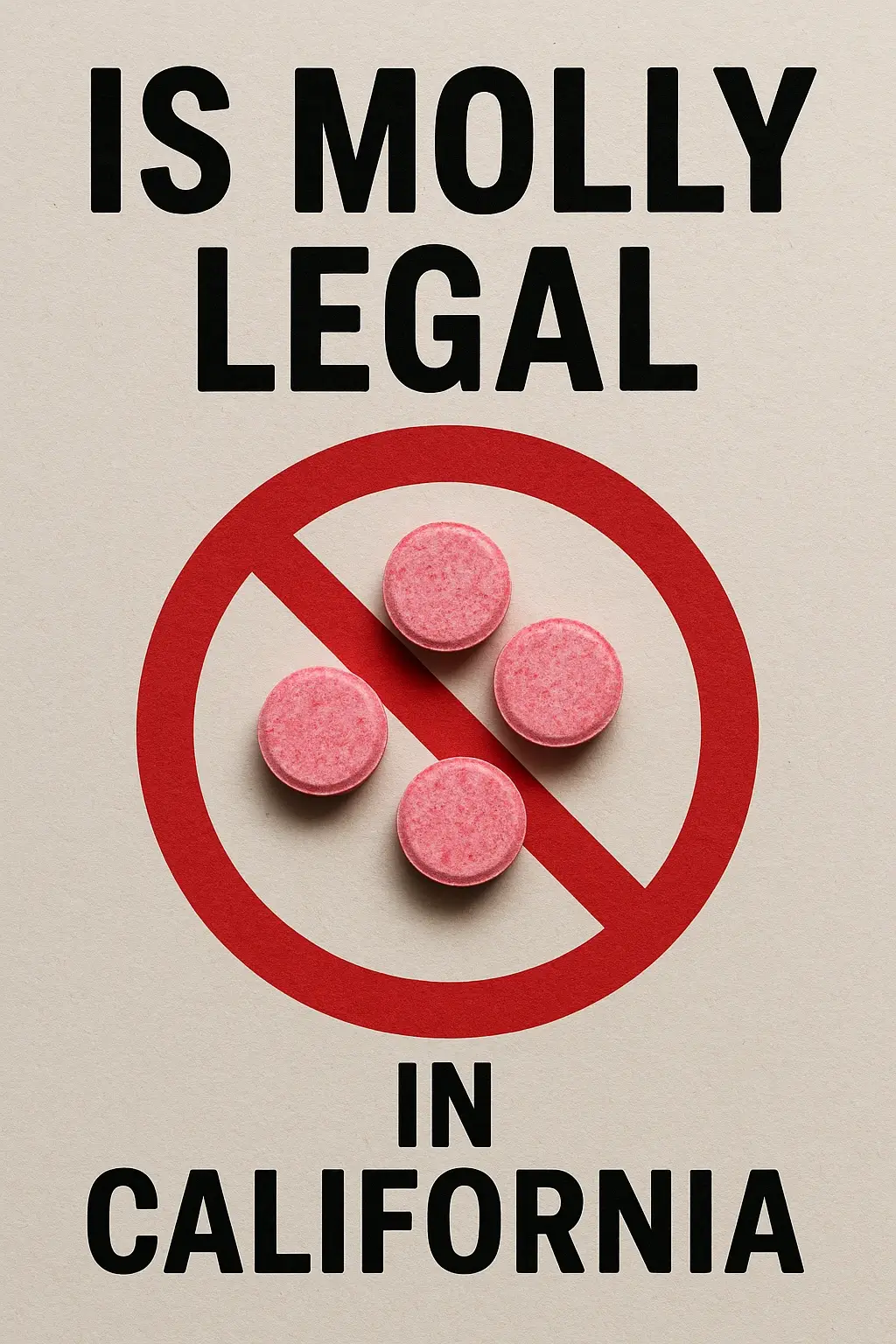
Is Molly Legal in California? Understanding the Laws and Implications
Is Molly legal in California? No, Molly, or MDMA, is illegal due to its classification as a Schedule II controlled substance. The state enforces strict penalties for its possession, use, and distribution. This article explores these legal restrictions, the penalties involved, and the ongoing discussions that could potentially change its status in the future.
Key Takeaways
- Molly (MDMA) is classified as a Schedule II controlled substance in California, with strict penalties for possession and distribution due to its potential for abuse and lack of accepted medical use.
- Possession of Molly can lead to misdemeanor charges, with penalties increasing for repeat offenders, while selling or trafficking carries felony charges with significantly harsher consequences.
- There are various defense strategies available against Molly charges, and first-time, non-violent offenders may qualify for drug diversion programs that can lead to the dismissal of charges.
What Is Molly?
Molly, or MDMA, stands for Methylenedioxymethamphetamine. It is both a stimulant and a hallucinogen, often used recreational drugs for its ability to produce intense euphoria and increased energy. Users frequently report feelings of empathy and heightened sensory perception, making it a popular choice in social settings like parties and music festivals.
Molly is available in various forms, such as:
- pills
- gel capsules
- powder
- sometimes liquid
This variety makes it easily accessible and appealing to different types of users for personal use. However, the effects and legal regulations surrounding recreational use of concentrated cannabis are equally diverse and complex.
Knowing what Molly is and how it functions helps explain why it is so heavily regulated and the severe consequences tied to its possession and distribution.
Legal Status of Molly in California

Under California law, Molly is classified as a Schedule II drug controlled substance under California uniform controlled substances. This classification is due to its high potential for abuse and the lack of accepted medical use. Despite its popularity in recreational settings, the state has taken a strict stance against its use, possession, and distribution.
Ongoing research and discussions about the potential acceptance of MDMA-assisted psychotherapy could influence its legal status in the future. The FDA is considering approving this form of therapy, potentially leading to changes in how Molly is viewed under California health and safety regulations.
Common Molly-Related Crimes in California
The possession and distribution of Molly are strictly prohibited under California law. Simple possession of ecstasy possession, classified under Health and Safety Code 11377, is one of the most common Molly-related crimes. While simple possession might seem minor, the penalties can still be significant, especially for repeat offenders.
Possessing Molly with the intent to distribute is a much more serious felony offense. Classified as a felony, this crime can lead to severe consequences, including imprisonment for up to three years and fines up to $10,000. The legal system’s stringent stance on trafficking reflects its efforts to curb the distribution of illegal drugs, making it illegal to possess such substances, including possession for sale.
Trafficking ecstasy, especially across county lines, can result in even harsher penalties, including up to four years in California state prison. Such severe legal ramifications underscore the importance of adhering to California’s stringent drug laws to sell ecstasy.
Penalties for Molly Possession
Under California Health and Safety Code 11377, possession of Molly is typically classified as a misdemeanor. The penalty for simple possession can include up to one year in jail and fines up to $1,000. This classification underscores the state’s intent to penalize even non-violent drug offenses.
For repeat offenders, the consequences become much more severe. If charged with Molly possession after a prior conviction, the new charge can be elevated to a felony. This escalation can result in imprisonment for 16 months to 3 years, reflecting the state’s zero-tolerance policy towards repeat drug offenders.
These penalties can have long-lasting impacts on one’s personal and professional life, even for first time offenders, including possible penalties under the penal code.
Selling or Transporting Molly

Selling or possessing Molly with the intent to sell is classified as a felony crime under California Health and Safety Code 11378. Convictions for these offenses can result in imprisonment for 16 months to 3 years and fines up to $10,000. These penalties aim to deter individuals from engaging in the sale of illegal drugs.
The consequences are even more severe for those caught transporting or selling Molly across multiple county lines. This offense can lead to a maximum prison sentence of 9 years, with potential jail time increasing when large quantities of Molly are involved, as enhanced penalties can increase prison time up to 15 years. These stringent laws reflect the state’s commitment to combating drug trafficking.
Recognizing the severe repercussions of selling or transporting Molly is crucial for anyone involved in or considering such activities.
Being Under the Influence of Molly
Being under the influence of Molly is classified as a misdemeanor under California Health and Safety Code 11550. The penalties for this offense can include:
- Up to one year in county jail
- A fine up to $500
- Probation of up to five years, commonly offered and often requiring attendance at Narcotics Anonymous meetings.
Driving under the influence of ecstasy carries its own set of penalties. This offense is treated seriously, reflecting the dangers associated with operating a motor vehicle while under the influence of a powerful psychoactive drug that can affect the nervous system in certain circumstances.
Defenses Against Molly Charges
Several defense strategies can be employed against Molly charges in California. One common defense is demonstrating a lack of knowledge about the possession of the drug. If the defendant can prove they were unaware of the presence of Molly, the charges might be reduced or dismissed.
Challenging illegal search and seizure is another effective defense. If law enforcement violates the Fourth Amendment rights during a search, the evidence obtained may be suppressed, potentially leading to the dismissal of the case. Entrapment, where law enforcement illegally coerces someone into committing a crime, can also be a viable defense.
Defense strategies often focus on challenging the credibility of evidence, such as questioning the chain of custody and the reliability of witness testimonies. A skilled defender can tailor a strategy to the specific circumstances of each case.
Drug Diversion Programs for Molly Offenders
First-time, non-violent offenders charged with misdemeanor possession of Molly can qualify for drug diversion programs in California. These programs, including the pretrial diversion program under PC 1000, Proposition 36, and California drug court, offer an alternative to traditional sentencing.
Successful completion of a drug diversion program leads to the charge dismissed of Molly possession charges, allowing offenders to avoid a criminal record. These programs emphasize rehabilitation over punishment, reflecting a more compassionate approach to drug-related offenses.
Impact of Prior Convictions on Molly Charges
Prior convictions can significantly impact new Molly charges. If a person has a previous conviction for Molly possession, the new felony charge may escalate to felony charges, with penalties of 16 months to 3 years in prison. A defendant’s prior criminal history can also influence defense strategies and the likelihood of leniency.
Moreover, eligibility for drug diversion programs typically requires no prior drug-related convictions, limiting options for those with a criminal history. Knowing how prior convictions affect new drug charge is crucial for anyone navigating the legal system.
The Role of Medical Research and Clinical Trials

Studies are exploring the effects of MDMA on treating post traumatic stress disorder and comparing different session models for therapy. Research also aims to assess the neurobiological impacts of MDMA-assisted therapy, including changes in brain function and biomarkers.
Investigations aim to identify who may benefit most from MDMA therapy and how to optimize drug treatment delivery. This research could influence future legal status, potentially leading to an accepted medical use for MDMA.
How to Seek Legal Help for Molly Charges
Consulting a criminal defense attorney early is crucial for those facing Molly-related charges. An experienced attorney can provide clarity and strategy, significantly improving the chances of negotiating favorable plea deals.
A knowledgeable lawyer can help challenge such evidence against you and navigate the complexities of MDMA possession charges. Prompt legal representation allows for timely evidence investigation, which can be pivotal in the case’s outcome.
Understanding the legal landscape surrounding Molly in California is essential for anyone involved with or affected by this substance. From its classification and the associated legal risks to the potential defenses and the importance of seeking legal help, this blog post has covered the crucial aspects. Staying informed and seeking professional advice can make a significant difference in navigating these challenges.
From Legal Trouble to Lasting Recovery
How Legacy Healing Center Can Help
While legal support is vital in the face of MDMA-related charges, it’s equally important to address the root cause—substance use. If you or someone you care about is struggling with ecstasy or Molly use, there is help beyond the courtroom.
At Legacy Healing Center, we specialize in compassionate, evidence-based treatment for MDMA addiction. Our team understands the powerful grip of ecstasy and the toll it takes on your mental health, relationships, and future. Through customized care plans, trauma-informed therapy, and holistic recovery services, we guide clients toward long-term healing—not just legal relief, but personal transformation.
You don’t have to face this alone. Whether you’re just beginning to question your relationship with Molly or are already confronting legal consequences, now is the time to reclaim control and start fresh.
📞 Call Legacy Healing Center today at 888-534-2295 or verify your insurance online, and an admissions specialist will call you. We’re here 24/7 to support you on the path to recovery—with discretion, compassion, and proven results.
Frequently Asked Questions
What is the legal status of Molly in California?
Molly is classified as a Schedule II controlled substance in California, indicating a high potential for abuse and no accepted medical use. Therefore, its possession and use are illegal.
What are the penalties for simple possession of Molly?
The penalties for simple possession of Molly may include up to one year in jail and fines reaching $1,000. It is essential to recognize the legal consequences associated with such offenses.
Can prior convictions affect new Molly charges?
Yes, prior convictions can lead to escalated charges for new Molly offenses, increasing potential penalties to 16 months to 3 years in prison.
Are there any legal defenses against Molly charges?
Yes, legal defenses against Molly charges may include demonstrating a lack of knowledge, challenging illegal search and seizure, and entrapment. These strategies can be critical in mounting an effective defense.
What are drug diversion programs?
Drug diversion programs provide first-time, non-violent offenders with an opportunity for rehabilitation instead of traditional sentencing, ultimately allowing for the dismissal of charges upon successful completion.






 Verify Insurance
Verify Insurance